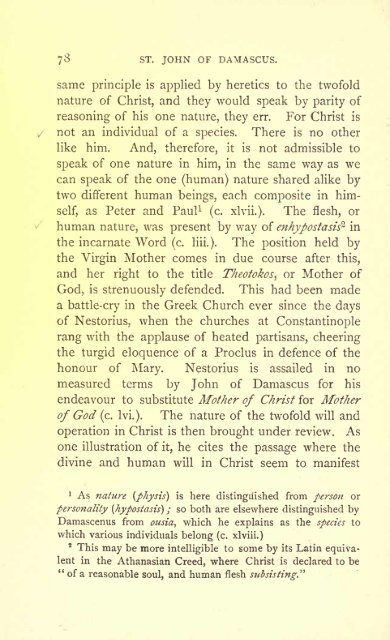st. john of damascus (676-749 - Cristo Raul
st. john of damascus (676-749 - Cristo Raul
st. john of damascus (676-749 - Cristo Raul
You also want an ePaper? Increase the reach of your titles
YUMPU automatically turns print PDFs into web optimized ePapers that Google loves.
78 ST. JOHN OF DAMASCUS.<br />
same principle is applied by heretics to the tw<strong>of</strong>old<br />
nature <strong>of</strong> Chri<strong>st</strong>, and they would speak by parity <strong>of</strong><br />
reasoning <strong>of</strong> his one nature, they err. For Chri<strong>st</strong> is<br />
/ not an individual <strong>of</strong> a species. There is no other<br />
like him. And, therefore, it is not admissible to<br />
speak <strong>of</strong> one nature in him, in the same way as we<br />
can speak <strong>of</strong> the one (human) nature shared alike by<br />
two different human beings, each composite in him<br />
self, as Peter and Paul 1 (c. xlvii.).<br />
The flesh, or<br />
human nature, was present by way <strong>of</strong> enhypo<strong>st</strong>asi& in<br />
the incarnate Word (c. liii.).<br />
The position held by<br />
the Virgin Mother comes in due course after this,<br />
and her right to the title Theotokos, or Mother <strong>of</strong><br />
God, is <strong>st</strong>renuously defended. This had been made<br />
a battle-cry in the Greek Church ever since the days<br />
<strong>of</strong> Ne<strong>st</strong>orius, when the churches at Con<strong>st</strong>antinople<br />
rang with the applause <strong>of</strong> heated partisans, cheering<br />
the turgid eloquence <strong>of</strong> a Proclus in defence <strong>of</strong> the<br />
honour <strong>of</strong> Mary. Ne<strong>st</strong>orius is assailed in no<br />
measured terms by John <strong>of</strong> Damascus for his<br />
endeavour to sub<strong>st</strong>itute Mother <strong>of</strong> Chri<strong>st</strong> for Mother<br />
<strong>of</strong> God (c. Ivi.).<br />
The nature <strong>of</strong> the tw<strong>of</strong>old will and<br />
operation in Chri<strong>st</strong> is then brought under review. As<br />
one. illu<strong>st</strong>ration <strong>of</strong> it,<br />
he cites the passage where the<br />
divine and human will in Chri<strong>st</strong> seem to manife<strong>st</strong><br />
1<br />
As nature (pkysis] is here di<strong>st</strong>inguished from person or<br />
personality (hypo<strong>st</strong>asis) ; so both are elsewhere di<strong>st</strong>inguished by<br />
Damascenus from ousia, which he explains as the species to<br />
which various individuals belong (c. xlviii.)<br />
2 This may be more intelligible to some by<br />
its Latin equiva<br />
lent in the Athanasian Creed, where Chri<strong>st</strong> is declared to be<br />
"<br />
<strong>of</strong> a reasonable soul, and human flesh subsi<strong>st</strong>ing."
















